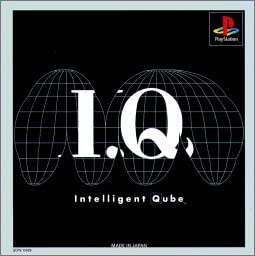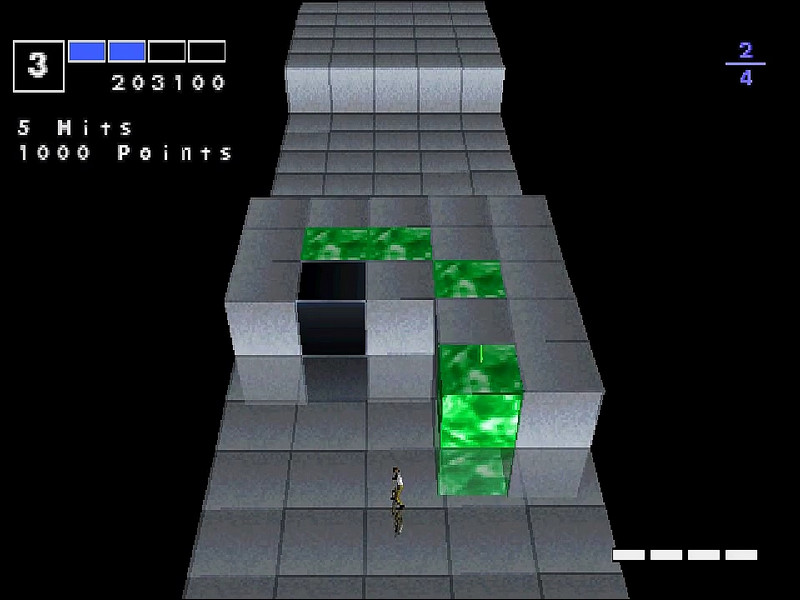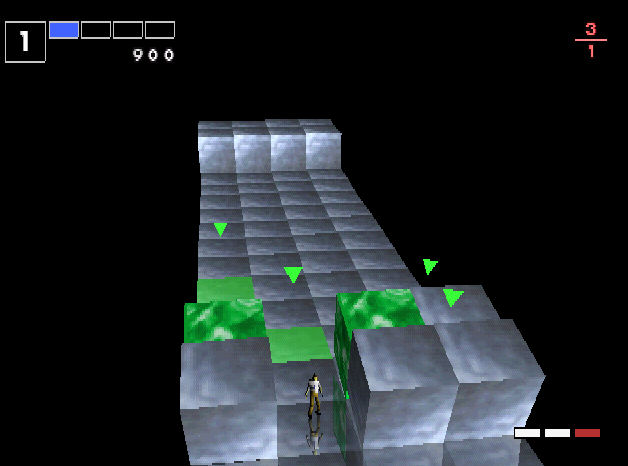+  |
| art by mikorinye |
|
+ mikorinye instagram |
| other writing |
|
+ on ratings and objectivity + intelligent qube + devils third + resident evil survivor |
| support me! |
|
+ + + help me get things to cover + sign my guestbook! (getting a new provider soon) + my backloggd |
| song used |
|
+ intelligent qube stage 4 |
| Layout Credits |
|
Layout by: Lovely Designs Brushes: [1] [2] Image: Hyung Taekim |
| impressions #2 intelligent qube |
IQ is easily one of my favourite puzzle games, it has an early 3D style that has charm for days and a very dictinct style at that, where a lot of puzzle games have issues standing out, you can take one look at IQ and know what game it is. it's this style that drew me to it at first, as it looked to me like a tech demo for what the ps1 could do, but the game is so much more than that. it plays wonderfully, it sounds amazing and it's a pretty quick game to beat too, with enough replayability to keep you coming back, especially if you get into the level editor.
 the actual gameplay is super easy to get into, the massive forboding wall of cubes is approaching and you must clear as many as you can and survive, it's interesting as a puzzle game with an explicit death state, which gives it a scarier atmosphere and far more stakes than both, watching your little player fall to their death is just grim to see. you have several block types too and the game uses all of them in very creative ways, by the end you'll have the feeling like you mastered all of them and it feels super cathartic after how the first round will feel almost like a struggle, though the atmosphere does admittedly capture me more than even the gameplay does.
the actual gameplay is super easy to get into, the massive forboding wall of cubes is approaching and you must clear as many as you can and survive, it's interesting as a puzzle game with an explicit death state, which gives it a scarier atmosphere and far more stakes than both, watching your little player fall to their death is just grim to see. you have several block types too and the game uses all of them in very creative ways, by the end you'll have the feeling like you mastered all of them and it feels super cathartic after how the first round will feel almost like a struggle, though the atmosphere does admittedly capture me more than even the gameplay does.

asahiko Sato was at the helm here, a professor from the tokyo university of the arts and as it turns outm a damn good designer. sadly this seems to be his only real series as he has only developed for it, up until IQ mania for the psp in 2006, the last game in the series for now. another major player here is takayuki hattori, the games composer. takayuki did a fantastic score for the game, being a sweeping orchestral suite, which, although i am not usually into orchestral soundtracks for games, is wonderfully unique and track 4 is something i listen to quite frequently. one other tidbit to note is that the japanese version of IQ final also features experianced broadcaster peter baraken as the narrator, a well regarded radio DJ and host of NHK world's japanology plus. 
the game just really stuck with me as it just feels mysterious, the void, the characters you unlock and the ost all give it a vibe all its own and make it feel almost spooky at times, the forboding track 3 especially almost feels unnerving and does wonders for the imagination, i can easily see this game scaring me as a kid. the game overall is a ton of fun though if you can get into it, the green blocks that almost explode and give you a ton of blocks cleared is a satisfying feeling few puzzle games can reach and you can easily beat it in a few hours. 100% reccomended. it's sequels are all a great time too, mostly just expanding on the core mechanics and keeping the solid aesthetic, but final has peter barakan, so it's my favourite. there was also PQ on the psp, aka intelligent licence in japan, a sort-of spiritual sequel that also got a sequel of its own also on psp which i intend to cover someday, it's pretty good.development-wise the game was handled seemingly by several stuidos, at least in some form or the other. the first of these was g-artists, a development studio that had a hand in almost every game in the series, as well as popolocrois and its later port, the cavia co-developed ghost in the shell SAC for ps2, and philosoma, a shmup for playstation. theor last game would be IQ mania in 2006. also on hand were sugar and rockets, who had a hand in the first 3 games but did not seem to have a hand in IQ mania. they are also known for their work likewise on popolocrois, the jumping flash sequel robbit mon dieu as well as covert ops: nuclear dawn, plus a few japanese exclusive titles. their last game was scandal for playstation 2 before they were dissolved in august of 2000, they are however credited on yukiwari no hana for psp in 2006. |